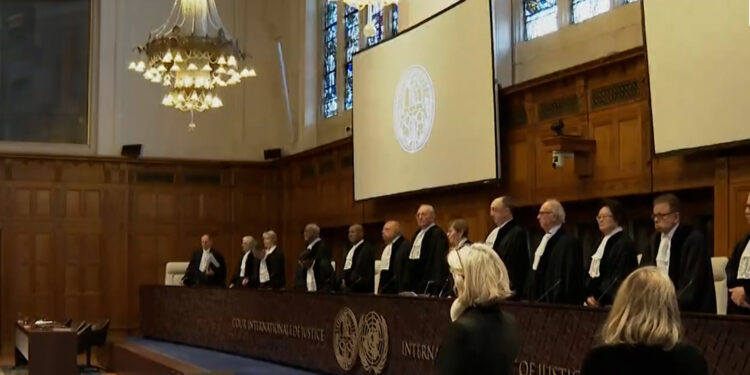This afternoon, the International Court of Justice began its first hearing on the lawsuit filed by South Africa against Israel on charges of committing genocide against the Palestinians in the Gaza Strip.
Israel had agreed to appear before the court in order to refute what it described as “ridiculous accusations that lack any factual or legal basis.”
But the Hebrew press confirmed that there is a serious fear in the Israeli security institutions and the Public Prosecution that the International Court of Justice will charge Israel with genocide.
The hearings will address South Africa’s demand to impose emergency measures and force Israel to suspend its military operations in Gaza while the court will consider the merits of the case, a process that may take years.
In the 84-page lawsuit, South Africa notes that Israel failed to provide basic food, water, medicine, fuel, shelter and other humanitarian assistance to residents of the Strip.
She also referred to the ongoing bombing campaign that destroyed hundreds of thousands of homes, forced about 1.9 million Palestinians to flee, and resulted in the deaths of 23,000 people, according to data from the health authorities in Gaza.
A panel of 17 judges, including two judges from Israel and South Africa, will hear three hours of arguments for each side. A ruling on the interim measures is expected later this month. The rulings of the International Court of Justice are binding, but the court does not have the power to implement them.
In an indication of the weight of the term genocide, Israel sent a former Supreme Court judge who had survived the Holocaust, which occurred before the signing of the Genocide Convention. South Africa will appoint a judge who spent 10 years on Robben Island in his youth, where he met former South African President Nelson Mandela.
Another court in The Hague, the International Criminal Court, is separately investigating charges of atrocities in Gaza and the West Bank and the October 7 attack on Israel, but has not named any suspects. Israel is not a member of the International Criminal Court and rejects its jurisdiction.
Exchange of accusations
For his part, South African President Cyril Ramaphosa said on Wednesday, “Our opposition to the ongoing massacre against the people of Gaza prompted us, as a state, to resort to the International Court of Justice.”
He added, “As a people who have once suffered the bitterness of dispossession, discrimination, racism, and state-sponsored violence, we are clear that we will stand on the right side of history.”
On the other hand, Israeli government spokesman Elon Levy said on Wednesday, “Tomorrow (Thursday), the State of Israel will appear before the International Court of Justice to refute the absurd bloodshed lie launched by South Africa, as Pretoria gives political and legal cover to the (Palestinian Islamic Resistance Movement) Hamas regime.” “The rapist.”
Arab support
The League of Arab States affirmed its full support and endorsement of the lawsuit filed by South Africa against Israel on charges of committing genocide and violating the 1948 Genocide Convention, expressing its aspiration for a just ruling that stops the aggressive war on the Gaza Strip and puts an end to the Palestinian bloodshed.
The Secretary-General of the Arab League, Ahmed Aboul Gheit, said in press statements that the League’s General Secretariat supports the South African endeavor in all possible ways by being prepared to provide what serves the cause and strengthens the Palestinian position, adding that it is an important step not only towards a ceasefire but also holding the Israeli occupation accountable. .
In this context, the Libyan Presidential Council announced yesterday its support for the lawsuit against Israel, and affirmed in a statement its support by all means for the step taken by South Africa towards the Palestinian people, and the unprecedented genocide they are being subjected to at the hands of the Israeli occupation.
As for Tunisia, it said that it would not join any lawsuit filed against Israel “because of the implicit recognition of this entity,” but it confirmed that it would present oral arguments.
From Palestine, dozens gathered yesterday, Wednesday, in Ramallah, in the occupied West Bank, to “thank” South Africa for filing the lawsuit before the International Court of Justice.
Ramallah Mayor Issa Kassis told the crowd in front of a 6-meter-high statue of Nelson Mandela presented in 2016 by the Municipality of Johannesburg (South Africa): “We feel that South Africa hears our hearts and hears our pain.”



